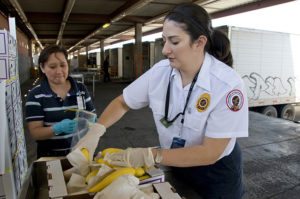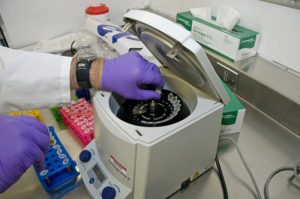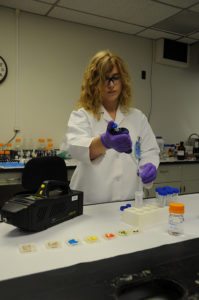FDA Regulation Keeps Both our Food and Medicines Safe

FDA consumer safety officer at the border. Source: www.flickr.com/photos/fdaphotos
When policymakers talk about drug importation, they often make comparisons to importation of food. "If we can import produce safely," they say, "don't tell me we can't import medicine." The truth is that importing food safely is difficult. The stakes are even higher when we import medicine: no one expects lettuce to cure cancer.
Recently, the Washington Post published an article about 36 million pounds of conventionally grown soybeans that were shipped from Ukraine to Turkey to California. Along the way, they acquired false certification documents designating them organic, which meant they were worth $4 million more in sales. According to the Post, 21 million pounds of these soybeans were distributed to customers before USDA officials discovered the fraud.
The problem isn't limited to false labelling. It can be life threatening. In 2007, the FDA and USDA launched an investigation into pet food adulterated with melamine. Pets who ate the food suffered kidney failure and death. In 2013, salad mix contaminated with cyclosporiasis sickened more than 400 people in at least 16 states. The mix had been imported from a farm in Mexico. In 2015, 907 people in 40 states caught salmonella from imported cucumbers. 204 people were hospitalized. Six died.

An FDA mobile lab analyst uses a centrifuge to test produce. Source: www.flickr.com/photos/fdaphotos
These tainted food cases were investigated by the FDA in collaboration with other agencies. The paper trail identifying where food products had come from and who had sold them allowed them to find the source of outbreaks.
When it comes to safe medicines, the same thing is true.
Between 2008 and 2010, the FDA issued a series of warnings about counterfeit weight loss pills that contained sibutramine, a controlled substance that can cause high blood pressure, seizures, tachycardia, palpitations, heart attack or stroke. Several consumers reported bad effects from taking these products, including an emergency room doctor who suffered a stroke. Together with ICE and the U.S. Postal Inspection Service, the FDA's Office of Criminal Investigations was able to identify the counterfeiter who was importing these drugs from China. He pleaded guilty in 2011.

An FDA scientist prepares to test dietary supplements. Source: www.flickr.com/photos/fdaphotos
In 2012 and 2013, the FDA discovered counterfeit versions of Avastin, a treatment for patients with late-stage cancer, being sold to doctors in the United States. The fake drug had no active ingredient, which meant that it did nothing for patients who were treated with it. The FDA traced the drug to foreign suppliers who shipped it from country to country to evade detection. They were able to warn doctors and patients about the fake medication and prosecute the companies who were responsible.
In 2016, the FDA prosecuted TC Medical for selling American medical practices unapproved prescription drugs and injectable devices illegally imported from India, Turkey, France, Italy and other countries. According to the indictment for the case, some patients who were treated with their medications ended up in the emergency room.
In all these cases the FDA has protected Americans from food and drugs that could harm them, but protecting Americans takes tremendous resources. As George Karavetsos, former head of FDA's Office of Criminal Investigations, pointed out in a recent editorial, the U.S. has the safest drug supply in the world, but drug importation would "shift the burden of protecting the health and safety of U.S. citizens from the FDA and place it in the hands of foreign countries and suppliers." The added volume of foreign drugs to examine would mean that the FDA could not adequately screen drugs coming into the country. If they did find problems, they would be unable to trace a drug back to its source.
Karavetsos isn't alone in his opinion. Since 2000, every head of the FDA has declined to implement drug importation because of these dangers. We need to let the agency which is here to protect us do its job.